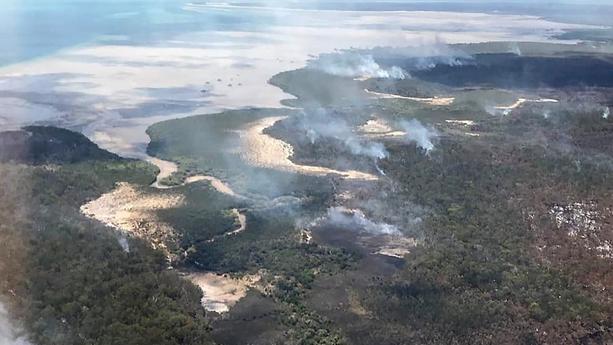 This handout picture taken on Nov 29, 2020 and released by the Queensland Fire and Emergency Services shows an aerial view of bushfires on Fraser Island, off Australia's east coast. (HANDOUT / QUEENSLAND FIRE AND EMERGENCY SERVICES / AFP)
This handout picture taken on Nov 29, 2020 and released by the Queensland Fire and Emergency Services shows an aerial view of bushfires on Fraser Island, off Australia's east coast. (HANDOUT / QUEENSLAND FIRE AND EMERGENCY SERVICES / AFP)
SYDNEY - After some of the worst fires and floods ever to hit Australia, a new cohort of climate-conscious independents are threatening to shake up the federal election on Saturday, putting the government under pressure in key districts and potentially reshaping the country's political landscape.
Enraged by the lack of government action on climate change, the candidates are campaigning hard on environmental issues in the hope of wooing moderate voters away from the major parties.
"There is deep frustration that real action hasn't been taken on climate change," said Allegra Spender, 44, an independent candidate in the wealthy Sydney electoral district of Wentworth. "It's become ideological rather than based on science and business, and that's what people are seeking: just a rational, proportional response to the evidence."
Opinion polls show "teal independents" are gaining traction among voters with their environmental, anti-corruption and gender equality policies, posing a threat to the established parties which have trodden lightly around the climate issue for fear of alienating voters in a country that is one of the world's largest exporters of coal and gas
Spender, a former analyst with McKinsey & Co, is one of more than 20 independent candidates, predominately women, who are running for seats in traditionally conservative, mostly urban districts, and who draw some of their funding from Climate 200, a fund set up three years ago to back candidates looking to advance climate policy.
About half a dozen of these candidates have come to be known as the "teal independents," reflecting the combination of their appeal to 'blue' moderate liberals and 'green' stance on climate change.
Opinion polls show the group is gaining traction among voters with their environmental, anti-corruption and gender equality policies, posing a threat to the established parties which have trodden lightly around the climate issue for fear of alienating voters in a country that is one of the world's largest exporters of coal and gas.
ALSO READ: Dire warning for Australia's Great Barrier Reef amid bleaching
Liberal Party leader Scott Morrison, who became prime minister in August 2018, seems likely to lose power at the election, ending nine years of conservative government.
A poll conducted last week suggested the Labor Party would win 80 seats, more than the 76 needed for majority government.
The poll showed the current government could be reduced to 63 seats with the remaining eight seats won by minor parties and independents. If the polls are wrong, as they were at the last election, a hung parliament where independents hold the balance of power is possible.
Treasurer Josh Frydenberg - the country's most senior finance minister and widely seen as the next leader of the Liberal Party – is in danger of losing his Melbourne seat of Kooyong to a teal independent, neurologist Monique Ryan, according to a recent poll. Another independent, former journalist Zoe Daniel, is leading a poll in her Melbourne seat.
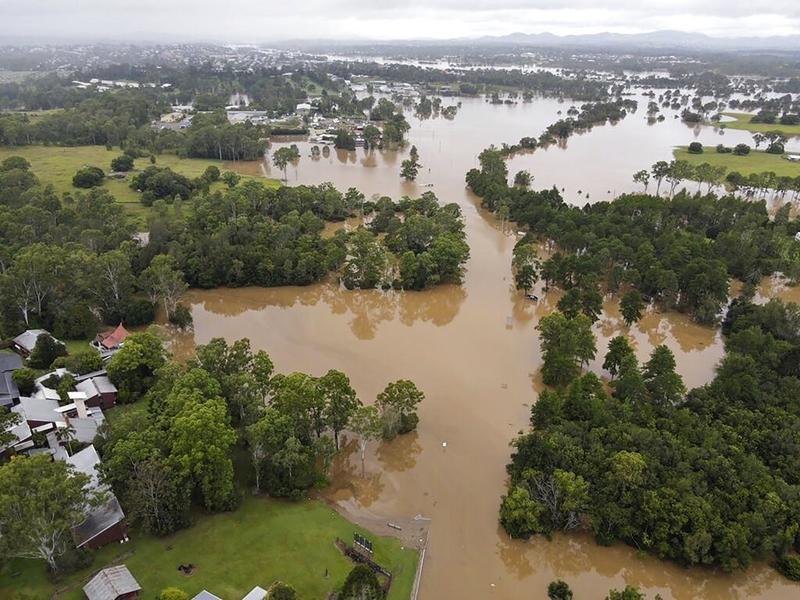 In this photo provided by the Queensland Fire and Emergency Services, water floods land and buildings near Gympie, north of Brisbane, Australia on Feb 27, 2022. (QUEENSLAND FIRE AND EMERGENCY SERVICES VIA AP)
In this photo provided by the Queensland Fire and Emergency Services, water floods land and buildings near Gympie, north of Brisbane, Australia on Feb 27, 2022. (QUEENSLAND FIRE AND EMERGENCY SERVICES VIA AP)
Spender appears to be attracting voters across the spectrum in Wentworth, which includes Bondi and some of the country's most affluent harbourside areas.
"Climate change," said 36-year-old Jess Daniel, when asked about her top priority after casting an early ballot in Bondi. "I have a little one and I am thinking of him, not just the here and now."
Treasurer Josh Frydenberg - the country's most senior finance minister and widely seen as the next leader of the Liberal Party – is in danger of losing his Melbourne seat of Kooyong to a teal independent, neurologist Monique Ryan, according to a recent poll. Another independent, former journalist Zoe Daniel, is leading a poll in her Melbourne seat
After 58 years of voting conservative, Ian Tresise has donned the teal T-shirt and joined Spender's army of 1,000 volunteers.
"The world's going to be cooked at 3 degrees," he told Reuters, referring to global warming, as he handed out flyers at a Bondi pre-polling booth. "It's getting pretty cooked at 1.5."
ALSO READ: Australia to appeal climate ruling that threatens fossil fuels
The goal of the Paris Agreement, which came into force in 2016, is to limit global warming to below 2 degrees Celsius, preferably to 1.5 degrees, compared to pre-industrial levels.
'Rack and ruin'
A survey published by the Lowy Institute independent think-tank last May showed that concern over climate change is rising, with 60 percent of Australians agreeing that "global warming is a serious and pressing problem," up from 56 percent the year before.
But away from the big cities, in areas which have experienced some of the country's worst natural disasters in the last few years, opinions remain deeply divided.
In Conjola, a quiet holiday town on the south coast of New South Wales, some doubt climate change has anything to do with the fires that ripped through the town in the so-called "Black Summer" of 2019-2020, or the floods that followed weeks after, and again in recent months. The fires came after Australia's hottest and driest year on record.
"These days we sneeze and its climate change," said Barry, 59, who witnessed the Conjola fires. He asked to use his first name only, for fear of being targeted by climate activists.
For some in Conjola, as in the nation's coal and gas heartlands, distrust of climate science is fused with concerns over jobs and rising living costs, which opinion polls show are still the most important issues for voters. Inflation hit a 20-year high in the first three months of the year, and voters are feeling the pinch as interest rates start to rise.
ALSO READ: US rejects Australia's climate strategy ahead of global summit
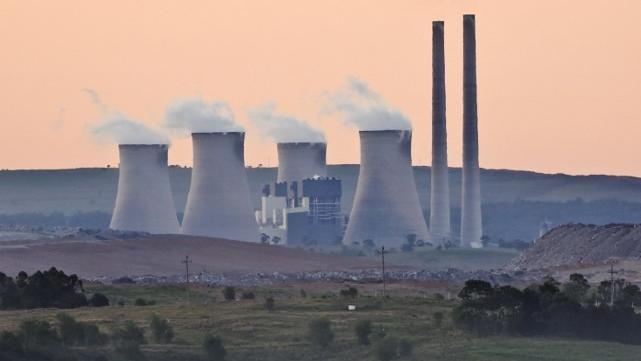 This photo taken on Nov 18, 2015 shows coal being produced at an open-cut mine in the Hunter Valley region, New South Wales, Australia. (WILLIAM WEST / AFP)
This photo taken on Nov 18, 2015 shows coal being produced at an open-cut mine in the Hunter Valley region, New South Wales, Australia. (WILLIAM WEST / AFP)
For some in Conjola, as in the nation's coal and gas heartlands, distrust of climate science is fused with concerns over jobs and rising living costs, which opinion polls show are still the most important issues for voters
The fossil fuel industry is a significant employer in every Australian state. Mining accounts for 11.5 percent of the country's economic output and fossil fuels make up about a quarter of total exports, according to Australia's central bank.
"It's a climate change election in that I want to vote for the government that is going to do the least," said Barry. "Because closing coal-fired powered stations is going to cost jobs."
Another Conjola resident, Samantha Kneeshaw, a high school science teacher who survived the fires by jumping in her pool with a scuba tank, said climate was the most important issue for her in the upcoming election.
"It is going to cause rack and ruin for so many people," she said. "I cannot fathom this government getting back in again and not doing anything, because Australia is so crucial to this climate debate."
Shifting the balance
To achieve the Paris Agreement goal of keeping global warming under 2 degrees, the Intergovernmental Panel on Climate Change says the world needs to cut greenhouse gas emissions by 50 percent by 2030 and reach net zero by 2050.
ALSO READ: Climate danger looms large over Australia
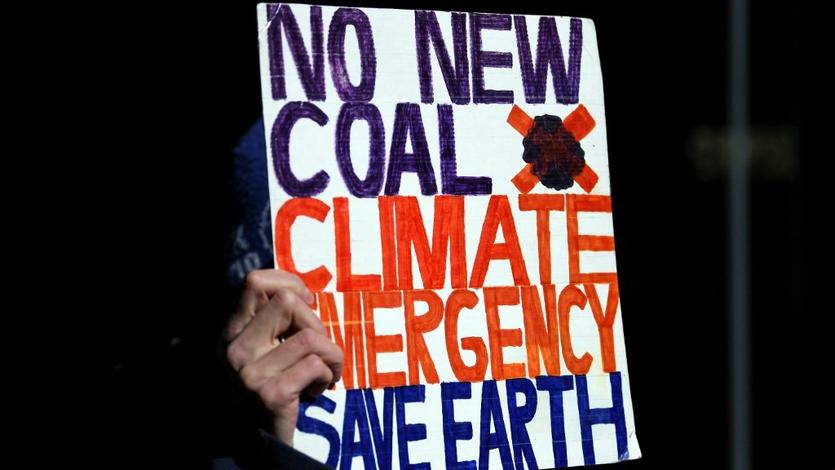 An environmental activist from Extinction Rebellion holds up a placard during a protest against the Adani coal mine project, outside the GHD engineering office building in Sydney on Aug 13, 2019. (SAEED KHAN / AFP)
An environmental activist from Extinction Rebellion holds up a placard during a protest against the Adani coal mine project, outside the GHD engineering office building in Sydney on Aug 13, 2019. (SAEED KHAN / AFP)
Australia is well below that and was branded a "holdout" by United Nations Secretary-General Antonio Guterres in March. At global climate change talks in Glasgow last year, Australia refused to commit to phasing out coal or increase its carbon emission reduction targets.
Australia was branded a "holdout" by United Nations Secretary-General Antonio Guterres in March. At global climate change talks in Glasgow last year, Australia refused to commit to phasing out coal or increase its carbon emission reduction targets
Morrison's coalition government has pledged to reduce emissions by 26 percent to 28 percent below 2005 levels by 2030 and hit net zero emissions by 2050, among the least ambitious of developed nations. But divisions within conservative ranks have raised questions over their commitment to the targets. In April, one Nationals senator in Queensland declared the government's net-zero 2050 target "dead."
After years of climate wars, many of Australia's politicians have shied away from promoting renewable energy or trying to wean the country off fossil fuels for fear of a backlash from industry and some voters.
On the campaign trail, Deputy Prime Minister Barnaby Joyce, the leader of the Nationals, said he would not use the term "transition" applied to a move to cleaner energy as it "equals unemployment." The opposition Labor Party is only slightly more ambitious, pledging a 43 percent reduction in emissions by 2030.
That has given the teal independents room to campaign on much more aggressive emissions targets. The group has already had an impact on the country's politics, and has put establishment parties on the defensive.
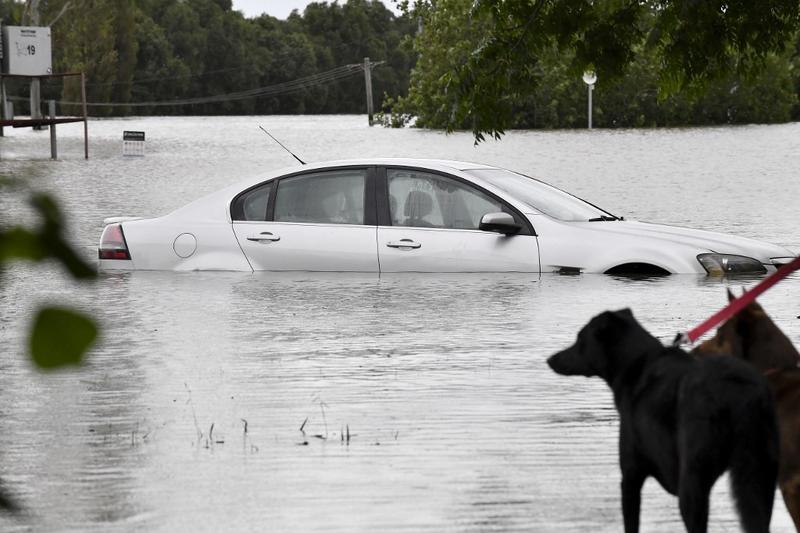 A car is seen stranded in floodwaters during heavy rain in southwestern Camden suburb of Sydney on March 8, 2022. (MUHAMMAD FAROOQ / AFP)
A car is seen stranded in floodwaters during heavy rain in southwestern Camden suburb of Sydney on March 8, 2022. (MUHAMMAD FAROOQ / AFP)
New South Wales treasurer and energy minister Matt Kean, representing the Liberal Party, warned voters specifically not to vote for the teal candidates running against progressive Liberal Party candidates.
"To see what happens when the progressive voices are removed from centre-right political parties, just look at the Republican Party in the United States," Kean said in an opinion piece published in the Sydney Morning Herald last weekend.
Frank Jotzo, a climate economist and professor at the Australian National University, said a general shift toward firmer climate change policies was underway.
READ MORE: Australia marks quietest fire season in a decade
"The fact that some of these climate change independents are getting so much interest and support in their respective electorates will shift the balance and is already shifting the balance among the parties they are competing with, in particular the Liberal Party."


